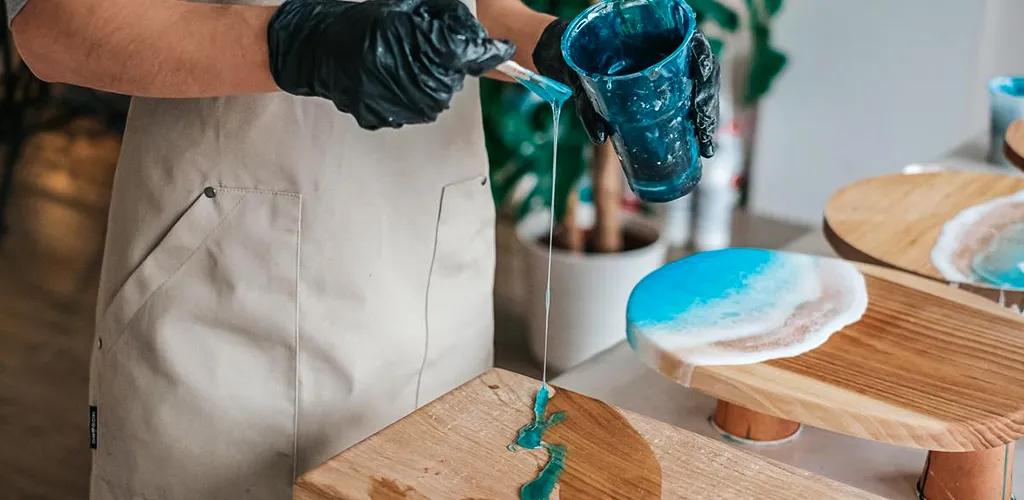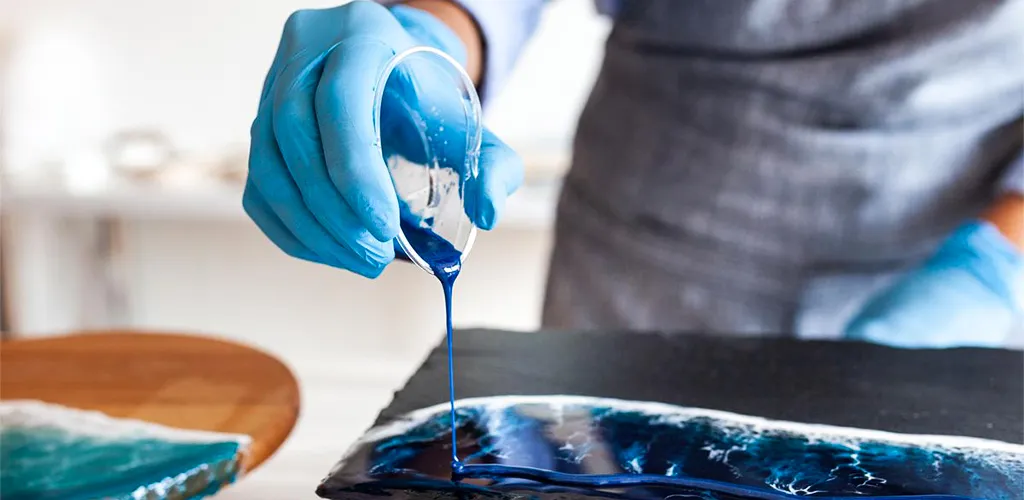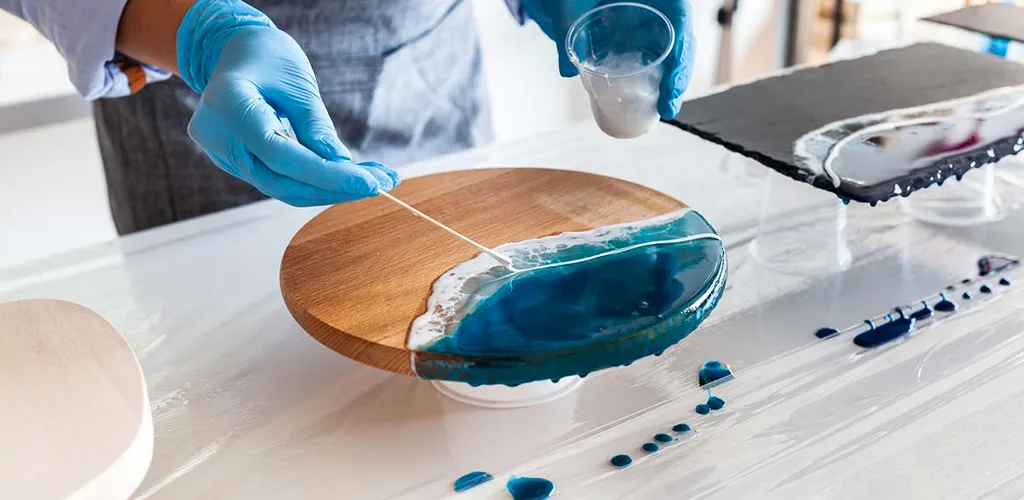Epoxy resin is a thermosetting polymer widely used in various applications due to its excellent adhesive properties, high tensile, compressive strength, and chemical and thermal stability. Epoxy resin is versatile and indispensable in modern materials, finding applications across various industries. From art and crafts to construction and engineering, epoxy resin has proven its mettle due to its exceptional properties and durability. Let’s highlight its significance in the market and its widespread applications!
What is Epoxy Resin?

Epoxy resin is a synthetic thermosetting polymer derived from petroleum, characterized by its exceptional strength, adhesion, and resistance to chemicals and environmental factors. The primary constituents of epoxy resin are epoxide monomers, which polymerize when combined with a curing agent or hardener. The resulting chemical reaction forms a strong and durable bond, making epoxy resin a preferred choice in numerous applications.
Types of Epoxy Resin

Several types of epoxy resin are available in the market, each with unique properties and applications. Some of the most common types of epoxy resin are:
Clear Epoxy Resin: Clear Epoxy Resin is transparent when cured, making it ideal for encapsulating and preserving objects, creating jewelry, and producing glossy coatings on various surfaces.
Liquid Glass Epoxy: Liquid glass epoxy is renowned for producing a crystal-clear, high-gloss finish on tabletops, countertops, and wooden surfaces, enhancing visual appeal.
Epoxy Resin for Wood: Specially formulated to penetrate and protect the wood, this type of epoxy resin strengthens and stabilizes wooden structures, preventing decay and enhancing longevity.
5-Minute Epoxy: As the name suggests, this quick-setting epoxy resin offers rapid bonding, making it suitable for small repairs, household applications, and DIY projects.
Concrete Crack Repair Epoxy: Designed to repair and seal cracks in concrete structures, this resin ensures structural integrity and prevents further damage.
Epoxy Glue for Metal: This resin variant is commonly used in automotive and industrial repairs, offering superior bonding strength on metal surfaces.
Deep Pour Epoxy: Ideal for casting thick layers and creating river tables, deep pour epoxy prevents excessive heat buildup and ensures a smooth, bubble-free finish.
Properties of Epoxy Resin
Epoxy resin offers several excellent properties that make it suitable for numerous applications. The properties of epoxy resin are including:
High Strength: Epoxy resin exhibits remarkable mechanical strength, making it suitable for load-bearing applications and structural repairs.
Excellent Adhesion: Epoxy resin adheres strongly to various materials, including wood, metal, glass, and concrete, providing a secure and long-lasting bond.
Chemical Resistance: Resistant to chemicals and solvents, and is widely used in industrial settings, laboratories, and chemical storage facilities.
Low Shrinkage: Epoxy resins have minimal shrinkage during curing, ensuring dimensional stability and preventing cracking or deformation.
Electrical Insulation: Epoxy resin’s high dielectric strength and electrical insulation properties make it a preferred material for electronic and electrical applications.
Temperature Resistance: With excellent heat resistance, epoxy resin remains stable at elevated temperatures, making it suitable for use in demanding environments.
UV Stability: Some epoxy resin formulations offer UV resistance, preventing yellowing and degradation when exposed to sunlight.
Chemical Structure of Epoxy Resin

The backbone of epoxy resin is a chain of oxygen atoms with two carbon atoms on either side. This chain is called the “epoxide” or “oxirane” group. The most common type of epoxy resin is “diglycidyl ether of bisphenol A” (DGEBA), which consists of two glycidyl groups connected by a bridging phenyl ring.
The curing process involves the epoxide groups with a curing agent or hardener. Common curing agents include polyamines, anhydrides, and mercaptans, which initiate cross-linking, forming a three-dimensional network. This network structure imparts the material’s exceptional strength and other desirable properties.
Uses of Epoxy Resin

Epoxy resin is used in various applications due to its excellent properties and versatility. Some of the most common uses of epoxy resin are:
Art and Craft: Epoxy resin is widely used in creating stunning artworks, resin paintings, and jewelry due to its clear and glossy finish.
Construction and Repairs: Epoxy resin finds extensive use in construction, repair, and restoration projects, such as concrete crack repair, bonding metal and wood stabilization.
Coatings and Sealants: It is commonly used as a protective coating for floors, countertops, and furniture, offering resistance to abrasion, chemicals, and moisture.
Electronics and Electrical: Epoxy resin is an insulating material in electrical and electronic components, protecting against moisture and environmental contaminants.
Aerospace Applications: Epoxy resin’s lightweight and high-strength properties make it valuable in aerospace applications, including aircraft components and structural elements.
Industrial Applications: Epoxy resin plays a vital role in various industries, such as manufacturing, oil and gas, and chemical processing, due to its exceptional properties and versatility.
That's a Wrap!

Epoxy resin, with its diverse range of types, exceptional properties, and remarkable chemical structure, has earned its place as an indispensable material across multiple industries. From enhancing artwork’s aesthetics to ensuring concrete’s structural integrity, epoxy resin continues revolutionizing modern material applications. As technologies and formulations evolve, epoxy resin will remain a cornerstone in materials engineering, providing innovative solutions to complex challenges. You can make a purchase of high-quality epoxy resin in Pakistan from reliable manufacturer – Ressichem!

